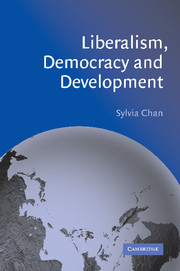Book contents
- Frontmatter
- Contents
- Acknowledgements
- List of abbreviations
- Introduction
- 1 The question: is ‘liberal democracy’ good for economic development?
- Part I The present context of democratisation and decomposing ‘liberal democracy’
- Part II The democracy–development debate: old problem, new thinking
- Bibliography
- Index
Part I - The present context of democratisation and decomposing ‘liberal democracy’
Published online by Cambridge University Press: 22 September 2009
- Frontmatter
- Contents
- Acknowledgements
- List of abbreviations
- Introduction
- 1 The question: is ‘liberal democracy’ good for economic development?
- Part I The present context of democratisation and decomposing ‘liberal democracy’
- Part II The democracy–development debate: old problem, new thinking
- Bibliography
- Index
Summary
Part I of this study develops the three-fold framework of ‘liberal democracy’ for analysing the democracy–development question. It sets up in chapter 2 a formal three-fold model of ‘liberal democracy’ that involves a distinction between the ‘liberal’ and the ‘democratic’, and further between ‘economic’, ‘civil’ and ‘political’ liberties. While liberalism is about the conditions of life and involves the entrenchment of liberties, democracy is about how political power is constituted and involves instituting the ‘rule of rules’ and agreeing to the rules of political competition and sharing power. The two are in fact very different things, and may conflict with each other, and the running together of the two in Western ‘liberal democracy’ is a product of history. Moreover, the relationship between the ‘liberal’ and the ‘democratic’ differs depending on whether we are talking about ‘economic’, ‘civil’ or ‘political’ liberties. Different societies – with quite different historical and cultural backgrounds – have different mixes of these elements of ‘liberal democracy’.
It will then be shown in chapter 3 that unbundling the concept of ‘liberal democracy’ in this way enables one to understand better the problems with democratisation in many developing countries. An examination of theories of ‘democratisation’ there shows that, although during a political change the bounds of agency expanded, there are various types of limiting factors to change. The problems and conflicts arising from these limits can be traced to a sometimes conflictual relationship between the ‘liberal’ and the ‘democratic’ parts of ‘liberal democracy’.
- Type
- Chapter
- Information
- Liberalism, Democracy and Development , pp. 37 - 38Publisher: Cambridge University PressPrint publication year: 2002

